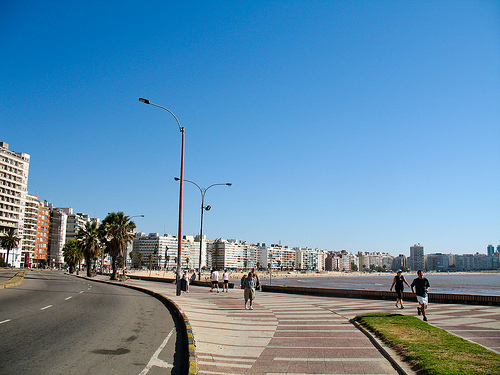Looking for a safe place to spend your retirement years? A place with a temperate climate, excellent health care and a stable economy?
Move Uruguay to the top of your list. It ticks all the boxes we've just listed, and more.
In Uruguay, the economy is strong. Despite declining trade relations with neighboring Argentina, Uruguay posted steady gains even during the depths of the recession. In recent years it's broken all previous tourism and construction records. So Uruguayans who left the country in years past for opportunities elsewhere in the world are now returning -- because the opportunities today are in Uruguay.
Along with Uruguayans coming home, people from around the world are taking note, attracted by the country's financial and political stability. It's a safe haven with tax advantages. And a physically safe place to live... although it must be said that as they have elsewhere in the world, crime rates have increased in recent years, especially in the capital city of Montevideo.

Photo Courtesy of InternationalLiving.com
All in, Uruguay is a "First World" and progressive country where you'll find mile after mile of modern highways... organic food, pure water right from the tap... and reliable electricity, telephone, and Internet service.
So it's no wonder more and more foreigners, too -- including a good number of retirees from the U.S. and Canada -- are deciding to call Uruguay home. Some come for the convenient city living. Others come to settle in the vast stretches of rolling pampas, or along the beautiful Atlantic Coast beaches.
Plain and simple, more and more are coming in search of a quality lifestyle -- a safe place to live in a country that's conflict-free; with mild weather, sustainable agriculture and a solid financial system.
And that's the beauty of Uruguay... it's all here...
Certainly, Uruguay has had a turbulent history. Over the years, Portugal, Spain, Brazil, and Argentina took turns ruling over this small country. It has also survived civil wars and a period of harsh military rule.
Today, though, Uruguay has emerged as one of the most stable democracies in Latin America. Its president, Jose Murica has been called the "poorest president in the world" because he donates his earnings to charity and lives on a small modest farm. Yet under his watch, the economy has prospered, as we mentioned, and unemployment rates are at an all-time low. By the way, he hasn't worn a tie in the last 20 years -- you gotta admire that.
So where exactly is Uruguay, you may be wondering? Grab your map of South America -- you'll find Uruguay tucked between Argentina and Brazil. At the bottom of the continent. The next land mass to the south is the Falkland Islands, and then Antarctica.
That doesn't mean it's cold in Uruguay. Far from it. Its location between 30 and 35 degrees in the southern latitude is akin to the Carolinas and Georgia in the Northern Hemisphere and you'll find similar weather but no major risk of natural disasters...
Annual rainfall averages about 41 inches and occurs fairly uniformly throughout the year, with no real wet or dry season, although rain in the summer months of January and February is rare. Uruguay enjoys four distinct seasons. Summertime temperatures average 65-82 degrees. Wintertime temperatures average 30-60 degrees. Thanks to pleasant sea breezes, most people don't need air conditioning in the summer but most everyone will need heat in the winter.
At about the size of the U.S. state of Missouri, Uruguay is the second-smallest country in South America and home to only about 3.5 million people... similar to a large North American city. Almost half of the country's population lives in the capital city of Montevideo.
And it's a very homogenous society. If you're tall or of fair complexion, you won't stand out here as you will in most of Latin America. That's because everyone in Uruguay is from somewhere else. Most are of European descent, primarily Italian and Spanish but also Portuguese, Armenian, Basque, German, and Irish, making the country an ethnic melting pot, much like the U.S. It's another reason the government is so welcoming to foreigners. It's a country made of immigrants.
If there's any real drawback to Uruguay, it's that for North Americans, it can feel like it's far from home, at least distance-wise. A non-stop flight from Miami takes nine hours. But as expats who live there told us, this is something you get used to.
"Personally, I have no problem," one said, "But I love to fly and I love to travel. The planes are always very big and comfortable."
Similarly, our friend David Hammond reports, "I look forward to the trip. That's when I catch up on my reading. When I'm flying on 777s I can also catch up on some new movies. Most of the flights between Miami and Uruguay are at night. I get on a plane in Miami, eat dinner, watch a movie, and then get some sleep. They wake me in the morning, I eat breakfast, and the plane lands. Right now, when it is spring/summer in the Northern Hemisphere and fall/winter in the Southern Hemisphere, there is only a one-hour time difference between Miami and Uruguay--so there's really no jet lag. "
Read More:
Punta del Este, Uruguay: Like Venice Beach... Only Better
The World's Best Health Care Plan
Video: Three Areas to Consider When You Move to Punta del Este, Uruguay